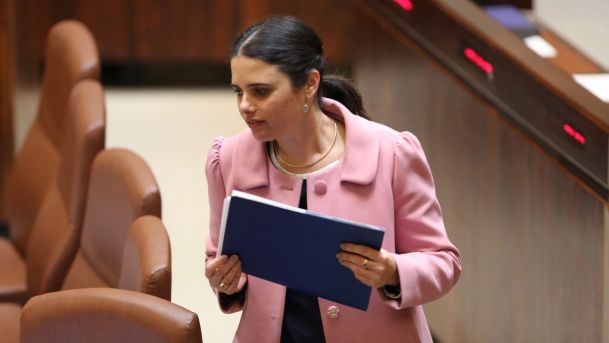KNESSET APPROVES «NGO TRANSPARENCY BILL» IN FIRST READING
The Knesset approved the so-called NGO transparency bill during its first reading, on Monday night, with 50 parliamentarians voting in favor and 43 opposed. The contentious bill, sponsored by Justice Minister Ayelet Shaked (Habayit Hayehudi), demands that NGOs which receive funding from foreign governments specify that in all their official publications, along with the names of the countries that contribute.

Author: Jonathan Lis
Photo: www.haaretz.com
The Knesset approved the so-called NGO transparency bill during its first reading, on Monday night, with 50 parliamentarians voting in favor and 43 opposed.
The contentious bill, sponsored by Justice Minister Ayelet Shaked (Habayit Hayehudi), demands that NGOs which receive funding from foreign governments specify that in all their official publications, along with the names of the countries that contribute.
The version of the legislation that was approved did not, however, include the original demand for representatives of NGOs visiting the Knesset or government ministries to wear identifying tags. That provision was removed from the final draft at the request of Prime Minister Benjamin Netanyahu.
However, despite another request by the premier, to expand the legislation to include all NGOs that receive foreign donations, the wording of the version passed on Monday applies solely to non-profits that receive more than half their funding from foreign governments.
“I think that we should demand that NGOs report on contributions they receive from foreign nations from the first dollar,” Netanyahu said last month. “That way the law will be comparable to U.S. legislation.”
The prime minister’s attempts to soften the bill’s wording came in the wake of growing international condemnation of the legislation, which is likely to single out leftist human rights organizations.
The requirement that NGOs identify foreign donors does not apply private funders abroad.
“You don’t even know why you oppose the bill,” Justice Minister Shaked said to opposition lawmakers during Monday’s Knesset session. “You went a long time ago from opposition in the name of ideology to opposition in the name of paranoia. Your arguments clash with each other head-on.”
Shaked specifically attacked Breaking the Silence, an anti-occupation NGO of former army soldiers, charging that the group had accepted a donation of 42,000 euros from a Dutch Christian organization on condition that they “deliver no less that 90 cases of incriminating evidence” against actions by the Israel Defense Forces.
“Those who oppose this bill need to defend these money transfers,” said Shaked.
In response, Zehava Galon, chairwoman of Meretz, said that the justice minister was trying to “silence organizations on the left and doesn’t understand basic democratic principles.”
“The bill is a disgrace to the Knesset,” said Yariv Oppenheimer, secretary general of the dovish Peace Now organization, in response to the vote. “Instead of demanding that right-wing organizations expose their sources of funding, the Knesset is approving a bill aimed entirely at singling out NGOs that oppose the Israeli government’s policies, even though [the source of] their funding is already transparent and open to the public.”
MK Aida Touma-Suliman (Joint List) declared that, in the case of this bill, “transparency is a synonym for political repression,” and added that the government seeks to crush those who are trying to protect the values of democracy.
Four German members of the European Parliament’s Foreign Affairs Committee sent a letter to Netanyahu last Friday expressing concern about the new legislation. The four Germans, three of whom are members of the pro-Israel group in the EU parliament, wrote that if the law passes it will restrict the activity of civil society, infringe on Israel’s democracy, damage freedom of expression and ultimately harm relations between Israel and Germany.
During the session, MK Hanin Zoabi (Joint List) was removed from the podium by Knesset ushers following a confrontation with MK Oren Hazan (Likud) and other coalition members.




